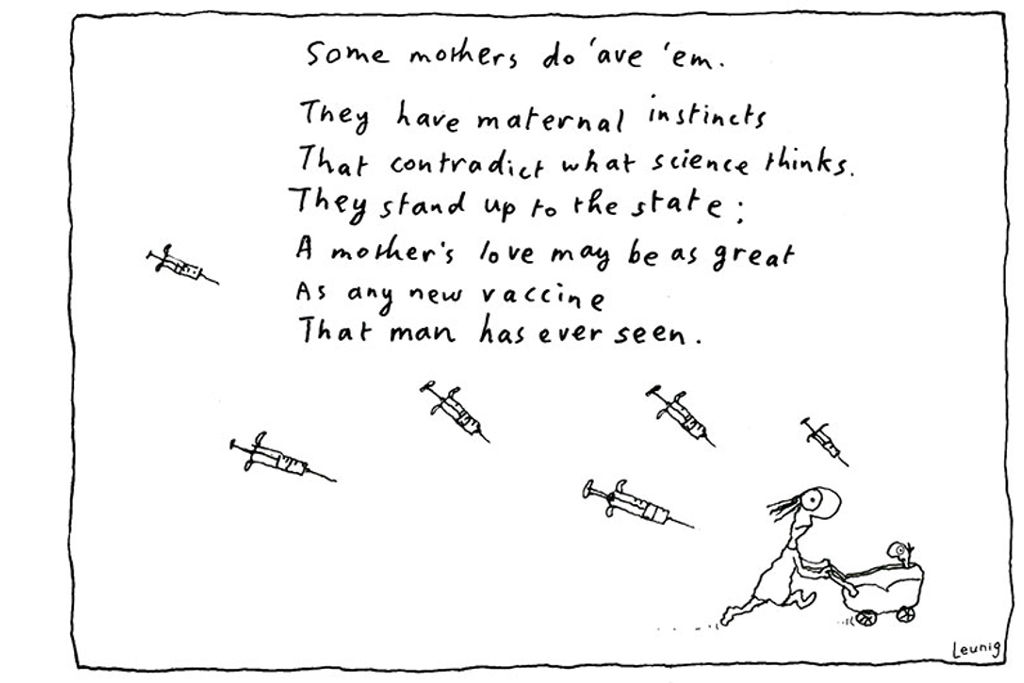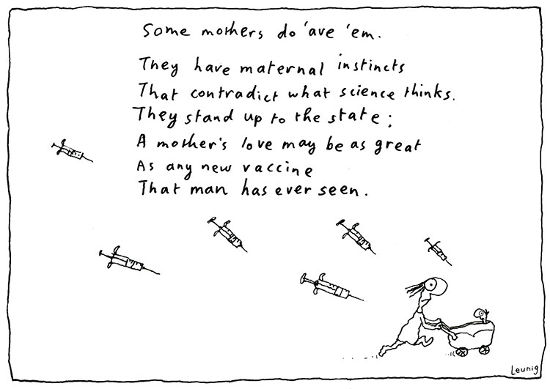Beloved Cartoonist Michael Leunig’s New Piece On Vaccination Is Upsetting A Lot Of People
Are cartoonists immune from criticism, or are they accountable to public opinion?

It’s a rare Australian who hasn’t encountered the work of cartoonist Michael Leunig. He’s been drawing for the Sydney Morning Herald and the Age for decades, covering politics, society, philosophy and culture with a unique perspective and style that has made his two primary characters, The Duck and Mr Curly, instantly recognisable. Leunig’s annually-released calendars are a fixture in many homes, and the man himself was named an Australian National Living Treasure in 1999.
This morning, a Leunig cartoon published in the Age began attracting strident criticism on social media for seemingly arguing against mothers vaccinating their children, including the line “A mother’s love may be as great as any new vaccine that man has ever seen.” Childhood vaccination (or lack thereof) has been in headlines recently, with the government announcing on Monday that parents who identify as so-called “conscientious objectors” to vaccination will no longer be eligible for family tax and childcare payments. The move has been criticised by medical professionals concerned it will further discourage vaccine-skeptical parents from seeking vital medical information about vaccines.

(Source: leunig.com.au)
The cartoon has attracted a furious response, notably from people with family members who have contracted preventable diseases. Others have claimed the cartoon is satirical of the anti-vax movement, or that its message is more ambiguous than first impressions would suggest.
Note to Age: I’m sure Grandma loved my Uncle. But he was one of the 40,000 Australians who contracted paralytic polio pic.twitter.com/5NI8cyZSWv
— Chris Uhlmann (@CUhlmann) April 15, 2015
Dear #leunig , don’t think mother’s love could have prevented by Dad’s polio, but a vaccine would have #auspol — Lenore Taylor (@lenoretaylor) April 15, 2015
Wonder what the child mortality rate from preventable diseases would be in Leunig’s People’s Republic of Whimsy?
— Bernard Keane (@BernardKeane) April 15, 2015
Has it occurred to anyone that #leunig is having a go at anti vaxxers? No? Continue to lynch him then. — Madame Moar (@merkinabout) April 15, 2015
Junkee contacted Leunig for clarification, and while he “is not commenting on his attitudes to vaccination,” according to a spokesperson, “his cartoon on the subject addresses the issues of hostility towards those who choose not to have their children vaccinated and defends their right to a personal position. [Leunig] feels the punitive approach by the government to people of conscientious belief regarding this matter is unjust and sets an appalling example to society about how those opposed might be universally regarded and treated.” As the controversy built, a Leunig cartoon published in 1997 that seemed to take a similar stance on vaccination resurfaced, with people on social media pointing to it as further evidence of Leunig’s views on childhood vaccination.

Leunig has attracted controversy before, sometimes in dubious circumstances — his cartoons on the Israeli occupation of Palestine have long been taken by some critics as evidence of Leunig harbouring anti-Semitic sentiments, particularly a 2012 cartoon titled ‘First they came for the Palestinians…’. In 2006 former Chaser writer Richard Cooke, posing as Leunig, sent an unpublished Leunig cartoon to an Iranian newspaper competition calling for cartoon depictions of the Holocaust as a prank. The cartoon won, and the resulting furore was described by Leunig at the time as an “extreme… twisting and distorting of my life.” For his part, Leunig has vigorously defended himself against accusations of anti-Semitism for as long as he’s been the target of them.
Why do they always illustrate vaccination stories with pictures of crying babies? pic.twitter.com/HJR2kjDKKb
— Sir Madame Wilcox (@cathywilcox1) April 15, 2015
Whether or not Leunig genuinely believes childhood vaccinations to be harmful — and whether the Age should have questioned his latest cartoon before putting it to print — the incident presents another example of the complex interplay between cartoons, satire, freedom of speech, political correctness and community expectation that last came to prominence in the #JeSuisCharlieHebdo debate. In response to accusations of anti-Semitism, Leunig wrote in 2012: “My cartoons have also had me labelled a misogynist, a blasphemer, a homophobe, a royalist, a misanthrope and a traitor, to name but a few. I would sum it all up by saying: I am a cartoonist.”
–
Feature image via leunig.com.au.